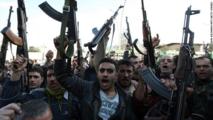Deadly clashes in Syria as EU-Russia seek solutions
AFP
DAMASCUS- Syrian government troops fought deadly battles with armed rebels on Monday as the European Union pushed for an end to a split with Russia over how to end the 15-month bloodshed.
In talks in Saint Petersburg with Russian President Vladimir Putin, EU President Herman Van Rompuy said the EU and Russia "might have some divergent assessments" of the situation in Syria.

Government forces attacked rebel strongholds in Idlib province in the northwest and Deir Ezzor in the northeast as violence nationwide claimed at least 35 lives on Monday, the Syrian Observatory for Human Rights said.
The Britain-based watchdog said that the fighting in Idlib's Jabal al-Zawiya hill district, in which two rebel fighters were killed, was the most intense since the uprising against President Bashar al-Assad's regime erupted in March last year.
In Deir Ezzor, the government deployed helicopters to strafe suspected rebel hideouts in farmland in the Sbeikhan district and one was hit by rebel fire, the Observatory said.
The fighting came after the military suffered major losses to the rebel Free Syrian Army over the weekend following its announcement on Friday that it was resuming "defensive operations" because of the failure of a UN-backed ceasefire that was supposed to go into effect from April 12.
The Observatory said 19 soldiers, eight rebels and 19 civilians were killed in violence across the country on Sunday.
On Saturday, 57 soldiers were killed nationwide, the biggest single day losses for the military of the uprising, the watchdog said.
On Monday the army lost at least 16 men in fighting with rebels, it added.
In Saint Petersburg, Van Rompuy said the EU and Russia fully agreed that the Annan plan provided the" best opportunity to break the cycle of violence in Syria, avoiding a civil war and finding a peaceful, lasting solution."
"We need to combine our efforts in order for this to happen and to find common messages on which we agree," he said.
Van Rompuy had been expected to press Putin to harden his line against Assad's regime.
International frustration with the Kremlin's stance on Syria is growing again after Russia refused to squarely blame Assad for the massacre of more than 100 people near the central town of Houla last month, instead saying rebels shared some of the responsibility.
Washington accused Assad of lying in a weekend speech in which he denied any involvement by his government in the killings.
Asked if Assad lied, President Barack Obama's spokesman, Jay Carney, said: "Yes.
"As evidenced by the very massacres that the Assad regime participated in and is now denying, the sooner that political transition takes place, the better for the people of Syria, and the better the chances that a bloody sectarian war will be avoided," Carney told reporters.
Annan is to discuss the Syria crisis at the UN Security Council on Thursday and in talks with US Secretary of State Hillary Clinton in Washington on Friday.
The former UN chief has himself demanded a "serious review" of deadlocked efforts to end the bloodshed and is stepping up pressure on international powers to put some muscle into their support for his peace plan or find a Plan B, diplomats said in New York.
Clinton spoke Monday with Russian Foreign Minister Sergei Lavrov "about bringing more pressure to bear on Assad, on the regime to comply with all six aspects or components of the Annan plan, including a democratic or political transition," State Department spokesman Mark Toner told journalists.
Arab League chief Nabil al-Arabi is to head to the United Nations later this week to press for swifter implementation of the Annan plan, a League official said.
"Arabi's four-day visit, starting on Thursday, will focus on the Syrian crisis and on efforts to convince the UN Security Council of the need for an urgent solution," the official said.
Arab ministers said on Saturday that the Security Council "must honour its responsibilities, in accordance with the UN Charter, and take the necessary measures to guarantee the full and immediate implementation of the Annan plan, in a limited time frame."
As many as 2,400 of the more than 13,500 people killed since the uprising began have died since the UN-backed ceasefire was supposed to come into force on April 12, according to the Britain-based Observatory.
-------------------------------------------------------------------------------------